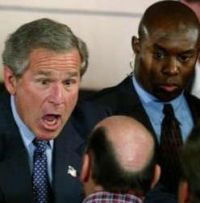Bush's informality and regular abuses of power to become his habit
Many polls and studies have showed that George Bush’s rating is nose-diving. And actually there are some reasons for it, among which are the following: war in Iraq , secret CIA prisons, eavesdropping, Katrina response and some other.

He called Canada 's prime minister by his first name, massaged German Chancellor Angela Merkel's shoulders and played tour guide to Japanese Prime Minister Junichiro Koizumi at Gracelan , the Memphis, Tennessee, home of Elvis Presley, the AP writer Natasha T. Metzler says.
His biggest gaffe was that caught-on-tape moment at the G-8 Summit last month with British Prime Minister Tony Blair _ the one that featured Bush cursing and talking with his mouth full before a microphone that was supposed to be off.
While four-letter expletives or a shoulder massage of a co-worker of the opposite sex could raise eyebrows in many office settings, Bush for the most part gets a pass from etiquette experts.
"Part of it is he comes from Texas , and they don't stand on a lot of formality in that state," said Letitia Baldrige, who was President John F. Kennedy's social secretary. "I think you get the Eastern kind of aristocrats, like the old days, they're always going to be more formal, they're always going to have a jacket on."
All presidents take an individual approach to protocol, Baldrige said, noting that presidents Jimmy Carter and Lyndon Johnson also were informal at times.
While Bush may seem casual in the way he interacts with other leaders, tradition still dictates the more rigid aspects of protocol, such as seating arrangements at state dinners, Baldrige said.
Informality can be a sign of a special rapport between leaders.
Paul Frazer, a former Canadian ambassador to the Czech and Slovak republics who now works as a consultant in Washington , counseled Canadians not to make too much of it when Bush addressed Prime Minister Stephen Harper as Steve earlier this summer, the AP reports.
But a friendly public relationship can confuse people, Frazer said. Canadians could get the wrong impression about how much influence their leader has over the U.S. president, he explained.
"It's where your mixing personality and policy, even when you have a relationship that's excellent, as you have between Canada and the United States ," Frazer said. "This is where some confusion can come in."
Christopher Bo Bramsen, protocol chief in Denmark 's Ministry of Foreign Affairs, said Danes accept informal behavior, like using first names, by their elected officials as a sign of friendship. "In my opinion this has not affected the etiquette, just made the situation more informal from time to time," he said.
However, that kind of informality in an audience with his country's monarchs would not be acceptable, Bramsen said.
Americans have embraced informality from the nation's beginning, partly as a reaction to the stuffy aristocratic etiquette of Old Europe, according to P.M. Forni, a professor at Johns Hopkins University and author of "Choosing Civility: The Twenty-five Rules of Considerate Conduct."
That Bush is a baby boomer who came of age when respect for authority was plummeting helps explain his behavior, Forni said.
Baldrige agreed, saying Bush is not so much breaking new ground as echoing the casual mood of the times. His ease with informality puts pressure on other politicians to take off their jackets and roll up their sleeves, too, she said.
"Some of them who are very conservative and formal think they've got to dress down, so as to appear as democratic as he does, and not too overly royal and stiff," she said.
Forni believes that when world leaders who, try as they might, are not seen as ordinary people _ interact in a very ordinary manner, it jars people.
"They go for the common touch," he said, "but it's a common touch that has something uncommon about it."
Subscribe to Pravda.Ru Telegram channel, Facebook, RSS!





